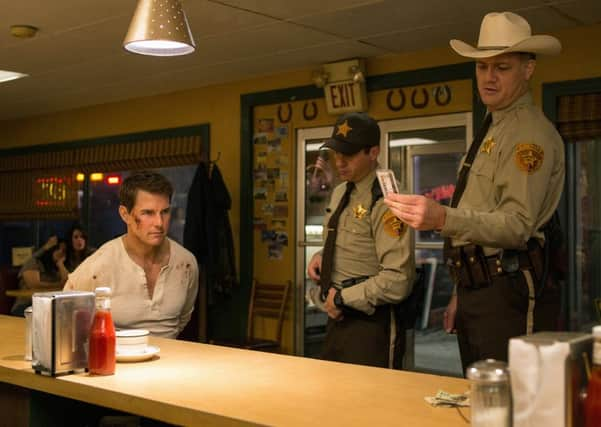Film reviews: Jack Reacher: Never Go Back | I, Daniel Blake | Queen of Katwe | Ouija: Origin of Evil


Jack Reacher: Never Go Back (12A) ***
I, Daniel Blake (15) ***
Queen of Katwe (PG) ***
Oujia: Origin of Evil (15) **
The title may be the name of the 18th book in Lee Child’s bestselling thriller series, but Jack Reacher: Never Go Back also feels like an ironic rebuke by Tom Cruise to all the naysayers who wrote off his take on Jack Reacher after the first film’s disappointing opening weekend four years ago. Back then, its initial failure to match Mission: Impossible’s box-office receipts was seen as another signal of Cruise’s waning popularity, a sign that Jack Reacher wasn’t a viable movie franchise for Hollywood’s one-time surest bet. Cruise said nothing. Instead he chose to bide his time, trusting that audiences would eventually realise the film was pretty good. They did. It eventually earned $250m at the box office.
That he’s decided to go back to Reacher now, though, is good news too for anyone who craves non-superhero-related action movies. Never Go Back may not be as entertainingly out-there as its predecessor – disappointingly there’s no villain to match Werner Herzog’s cloudy-eyed, finger-chewing weirdo – but it’s a solid mainstream thriller, which is increasingly hard to find these days.
Advertisement
Hide AdRetaining some of the humour of the first outing, the film drops us into the aftermath of a fistfight to re-establish Reacher’s semi-mythic status as an ex-military cop who drifts from city to city, helping those in need, like a lethal version of The Littlest Hobo. Returning to his old military base in Virginia, Reacher soon finds himself embroiled in an effort to help a new acquaintance clear her name. This is Susan Turner (Cobbie Smulders), an army major whose determination to investigate the recent deaths of some of her men has exposed her to a bigger threat from outside forces intent on keeping her silent.
That the espionage plot is the usual government conspiracy nonsense hardly matters. It’s there to let Cruise and Smulders spark off each other in between dispensing limb-breaking combat moves. Here, director Edward Zwick (who directed Cruise in The Last Samurai) undercuts Reacher’s cliché-ridden status as a lone-wolf-protector by making Smulders Cruise’s equal on the fight front. As such, damsel-in-distress duties are undertaken by Danika Yarosh, cast here as a streetwise teen who may or may not be Reacher’s daughter. This last plot turn helps Cruise deepen the character a little, justifying his return and paving the way for future instalments when those Mission: Impossible stunts get too much for him.
Recipient of this year’s Palme D’or, the Cannes love bestowed upon Ken Loach’s I, Daniel Blake remains a little baffling. Maybe the juxtaposition of watching a film that rails against food-bank Britain while done up to the nines in tuxedos was too perverse for a proper assessment of its clunky handling of urgent themes, but like many of Loach’s collaborations with Glaswegian screenwriter Paul Laverty, this is frustratingly simplistic as a supposed slice-of-life drama, full of groaning plot contrivances, one-dimensional supporting characters (the frontline workers at British benefit offices are evil incarnate according to this film), and a conclusion as manipulative as a Hollywood tear-jerker.
Saving it somewhat are the two lead performances. As Daniel Blake – a middle-aged carpenter who discovers he doesn’t qualify for state benefits after a heart attack forces him to stop work – actor and stand-up comedian Dave Johns adds nuance and humour to a character confronting the absurdity of a bureaucratic system that’s supposed to function as a safety net, but too often lets decent people fall between the cracks. But it’s Hayley Squires as Katie – a young single mother forced to relocate from London to Newcastle to qualify for housing – who steals the film. Even though Laverty and Loach subject her character to a less-than-convincing prostitution subplot, she brings quiet dignity to someone whose self-respect is being chipped away at every step of the way. When a starving Katie is forced to go to a food bank, Squires plays her subsequent breakdown – which is almost feral in nature – with such empathy it’s almost too much to bear. And the way Loach films it – his camera hanging back, as if too ashamed to look – only enhances its power. It’s the best scene in the film – and a brief reminder of just how great Loach can be.
It’d be easy to be sniffy about Queen of Katwe, a true-life inspirational sports movie about Phiona Mutesi (Madina Nalwanga), a Ugandan shantytown kid who discovered she had the makings of a chess grandmaster. Produced by Disney, it’s a polished, well-crafted film that rarely strays from the genre’s triumph-over-adversity formula. But it’s also the latest from Monsoon Wedding director Mira Nair, who proves adept at working within these parameters, yet brings a welcome feminist point of view that delicately explores the hardships facing women when it comes to coping with, or escaping, a life of poverty. The young cast of chess hopefuls – comprised mostly of amateurs – add real vibrancy, while David Oyelowo (as Phiona’s coach and mentor), and Lupita Nyong’o (as Phiona’s hard-working mother) ground the feel-good story in the complexities of the adult world.
Just in time for Halloween, Ouija: Origin of Evil serves up a 1960s-set prequel to the Michael Bay-produced 2014 money-spinner that was itself based on the eponymous occult-themed board game. If that doesn’t spell out cinematic Satan, nothing does – though it’s hard not have a modicum of goodwill towards a horror movie that casts Henry Thomas (Elliot from E.T.) as a kindly priest trying to save a family of mediums from the evil spirit of a deceased Nazi doctor. ■